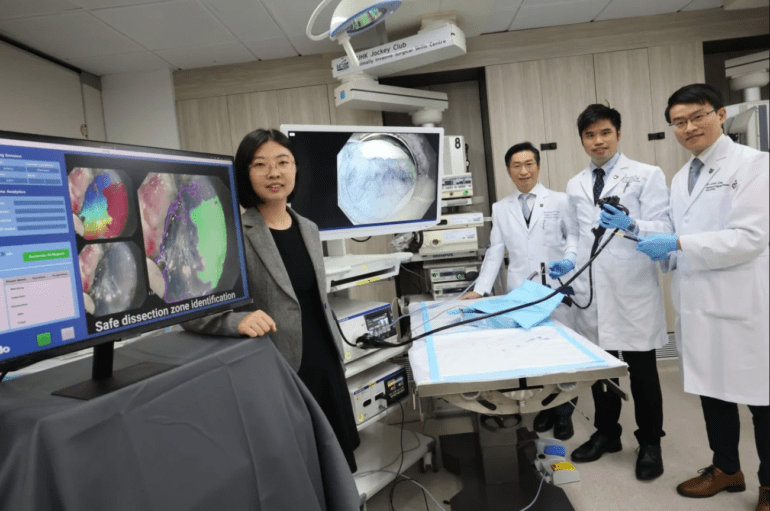TL;DR:
- Chinese University of Hong Kong’s medical faculty research reveals AI’s role in enhancing colonoscopy diagnostics.
- AI significantly aids in identifying adenomas, reducing the risk of missing smaller lesions.
- Colorectal cancer, the second most common cancer in Hong Kong, benefits from AI-assisted detection.
- The study involving 22 junior doctors demonstrates a substantial increase in adenoma detection rates with AI.
- AI-Endo, an AI-based platform, streamlines training for early-stage gastrointestinal cancer surgery.
- Clinical trials for AI-Endo are set to begin, potentially revolutionizing surgical procedures.
Main AI News:
In the realm of medical advancements, a team from the Chinese University of Hong Kong’s esteemed medical faculty has uncovered a promising development. Their research underscores the pivotal role of artificial intelligence (AI) in enhancing the diagnostic acumen of junior doctors during the critical procedure of colonoscopies.
Dr. Louis Lau Ho-shing, an assistant professor of medicine and therapeutics, elucidates that AI exhibits remarkable proficiency, particularly in discerning smaller growths known as adenomas, which might otherwise elude detection. The potential to reduce the “miss rate” in spotting these lesions holds immense promise.
Traditionally, a colonoscopy entails the use of an endoscope equipped with a miniature camera, providing a live feed for the attending physician to scrutinize the patient’s colon, the large intestine. Lau emphasizes that traditional colonoscopies necessitate a high degree of multitasking, making it possible for fatigue or inexperience to lead to the oversight of smaller lesions. He aptly likens the AI tool to “an extra pair of eyes,” adept at identifying potential tumors within the video footage.
This development is particularly pertinent in the context of colorectal cancer, the second most prevalent form of cancer in Hong Kong, and the second-leading cause of cancer-related mortality following lung cancer. In 2021, Hong Kong reported a staggering 5,899 new cases, constituting 15.3 percent of all newly reported cancer cases. To address this pressing concern, the government has initiated a subsidized screening program, targeting residents aged between 50 and 75.
The medical faculty, with nearly two decades of dedicated research into leveraging advanced technology for cancer treatment, began incorporating AI into colonoscopies in 2021. While previous studies had demonstrated AI’s efficacy in enhancing tumor detection rates among experienced doctors, none had delved into its potential benefits for less experienced practitioners.
The research team embarked on a comprehensive study, enlisting 22 junior doctors, each having performed fewer than 500 colonoscopies, to carry out the procedure on 766 patients. Of these, 386 underwent colonoscopies with AI assistance, while the remainder underwent conventional procedures. The results, published earlier this year, revealed a significant improvement in the adenoma detection rate for the AI-assisted group, standing at 57.5 percent, compared to 44.5 percent for those without AI support. Notably, AI proved exceptionally valuable in detecting small tumors measuring less than 5mm in diameter, with a detection rate of 40 percent for AI users compared to 25 percent for their counterparts. For medium-sized tumors, the respective detection rates were 36 percent and 29 percent.
Junior doctors with fewer than 200 colonoscopies under their belt derived the most substantial benefit from AI, achieving a remarkable 60 percent detection rate compared to approximately 42 percent for their peers.
While some of the city’s public hospitals have already acquired the AI detection tool, guidelines governing its application remain absent. Dr. Lau expresses hope that the study’s findings will propel the broader adoption of this transformative technology.
In parallel, the medical faculty has developed an AI-based platform known as AI-Endo, designed to facilitate the training of doctors in early-stage gastrointestinal cancer surgery. This innovative procedure enables the removal of stage one tumors without resorting to invasive surgery, albeit requiring a high degree of expertise. Currently, a doctor may need to perform nearly 100 such operations to attain proficiency. Dr. Yip Hon-chi, an assistant professor of surgery, envisions that AI-Endo will expedite the learning curve for less experienced doctors, potentially reducing the number of operations required to master the procedure. This two-year endeavor provides real-time guidance to doctors, predicting the necessary steps during surgery and generating post-operative reports.
A testament to collaboration, the university’s medical and computer science and engineering departments leveraged 12 years’ worth of surgical statistics, believed to be among the world’s most extensive datasets of its kind, to develop AI-Endo. The team’s sights are now set on commencing clinical trials for AI-Endo in the forthcoming year, ushering in a new era of precision and proficiency in gastrointestinal cancer surgery.
Conclusion:
The integration of AI into colonoscopies not only improves diagnostic accuracy but also reduces the risk of missing critical lesions, particularly for less experienced doctors. This breakthrough has the potential to enhance early detection and treatment of colorectal cancer, a significant market opportunity in the healthcare industry. Furthermore, AI-Endo’s development and upcoming clinical trials suggest a transformative shift in gastrointestinal cancer surgery, promising increased efficiency and proficiency for medical practitioners. This innovation highlights the growing importance of AI in healthcare, with opportunities for AI technology providers and healthcare institutions to collaborate and capitalize on these advancements.

